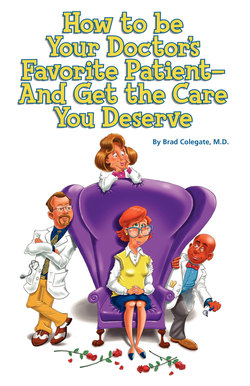Читать книгу How to be Your Doctor’s Favorite Patient - David Claytor - Страница 4
На сайте Литреса книга снята с продажи.
PERSONALITIES Trekkies
ОглавлениеJayvon Jackson hardly looked up when the doctor walked into the room; he was too busy playing the computer game he got for Christmas to notice. Having just passed Level 4, he was waging “The Ultimate Battle” on Level 5. He had learned all the tricks to the weapons in his arsenal, and they had made him the all-powerful master of this cyber-planet.
But on Planet Earth, he wasn’t invulnerable. The previous week he had come to the doctor’s office after feeling dizzy for three days. Dr. Jenna Brooks examined him but wasn’t sure what was causing his symptoms. When the physician ordered a panel of blood tests, Jayvon was certain it would reveal the answer to his diagnostic dilemma. So, on his follow-up visit, he was more than a little surprised when the Dr. Brooks now told him, “Your tests are all normal–no clues there.”
“What? You still don’t know what’s wrong?” he asked incredulously. “How about doing a CT scan, or an MRI?”
“If your symptoms persist, we may need to consider that, but I doubt it would be helpful, considering your normal neurological exam.”
“You mean to tell me, with all the tests you guys can do nowadays, you can’t always figure out what’s goin’ on?”
“Yes,” said Dr. Brooks with a sigh, “I’m afraid so.”
“Oh, man. Guess I was born a century too early.”
“Hold still, and we’ll have the diagnosis in 2.7 seconds!”
Science fiction is fascinating–a tantalizing look at what our future might someday hold–but it is still a fiction. We’ve all been enthralled by the Star Wars and Star Trek movies and television programs, and in a universe of intergalactic travel, it seems that anything is possible. But you don’t have to look too closely to see that those characters who conquer worlds can’t seem to conquer their own wrinkles or baldness.
To someone born a hundred years ago, the medical world of today might seem as fantastic as those movies. Medical technology, like computer, aviation, and other technologies, is doing things that once were only a dream. Sometimes all the new hardware gives us a false sense of security and shields us from the hard fact that people get sick and die–eventually. This isn’t to say that we shouldn’t use technology to our advantage, but that like any other resource, we need to recognize its limits, conserve it, and use it when appropriate.
Do expect your physician to order blood tests or imaging studies in evaluating unusual symptoms; sometimes they can help to pinpoint the diagnosis.
Don’t expect technology to provide the diagnosis and treatment. Medicine is still as much of an art as it is a science, and there still are humans behind the machines.
Don’t demand extensive testing as part of a routine check-up. Only a very few tests (such as cholesterol) have proven to be worthwhile for screening purposes.
Do ask for a second opinion if the testing goes on and on. A different human may find out more than the MRI machine.
Don’t smoke or engage in other unhealthy behaviors on the assumption that there will be a cure for lung cancer and other diseases twenty years from now—you may not live to see it!
